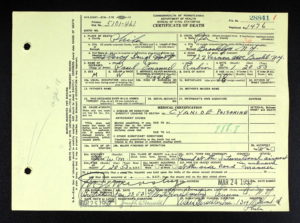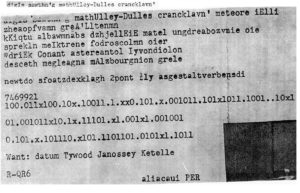Paul Emanuel Rubin was an 18-year-old chemistry student from Brooklyn NY whose body was found near Philadelphia International Airport on 20th January 1953: he had died from cyanide poisoning. Here is his death certificate:
His grave is listed online here as being “Gate: 568/S, Block: 8, Row: 005R, Grave: 3” at Montefiore Springfield Cemetery: though there are currently no images of it available.
The Paul Rubin Cipher
Taped to his abdomen was an as-yet-undecrypted ciphertext (image courtesy of Craig Bauer), which has become known as the Paul Rubin Cipher:
My transcription of this is:
digIs sawthn'g mathUlley-Dulles crancklavn' meteore iElli
zheaopfvamn greA'Lltenmn
kKiqtu albawmnabs dzhjellEiE matel ungdreabozvmie oie
sprekln meIktrene fodroscolmn oeir
*driEk Conant astereantol Iyvondiolon
desceth megleagna mAlzbourgnion grele
newtdo sfoatzdexklagh 2pont ¼ly asgestaltverbensdi
7469921
100.011x100.10x.10011.1.xx0.101.x.001011.101x1011.1001..10x1
01.001011x10.1x.11101.x1.001x1.001001
0.101.x.101110.x101.1101101.0101x1.1011
Want: datum Tywood Janossey Ketelle
R-QR6
aliacaui PER
A number of distinctive features of this ciphertext can immediately be pointed out:
* The “PER” in the bottom right corner is (without any doubt) short for “Paul Emanuel Rubin”
* A variety of different cipher types appear to be in use
* The cipher system on each line appears constant throughout that line
Most interestingly, the “7469921” and “R-QR6” lines appear to be cipher-table references for each of the other lines, i.e. where “digIs…” uses table 7, “zheaopfvamn…” uses table 4, “kKiqtu…” table 6, and so forth.
The most likely scenario would seem to be that Paul Rubin had a small book containing a number of different “home-grown” ciphers that he had devised: nine different alphabetic ones (1-9) and some non-alphabetic ones (Q and R). However, there is no mention of such a book in the news reports or in the FBI dossier.
From a cryptological point of view, this should mean that we can substantially increase the chances of solving individual lines by grouping together lines using the same cipher (i.e. the two ‘9’ lines, the two ‘6’ lines, and the two ‘R’ lines) and solving them as if they were larger
Finally: because of the (highly improbable) presence of “Conant” and “Dulles” in the covertext, it seems likely that the alphabetic ciphers use some kind of Trithemian null-insertion. (Trying to solve them as if they were a simple substitution cipher seems to lead nowhere.)
Paul Rubin’s FBI file
This 142-page file was provided by the FBI in response to a request for information by Craig Bauer for his book “Unsolved!”: sadly, it turned up after the book was complete.
Click here to download Paul Rubin’s FBI file (8MB PDF).

